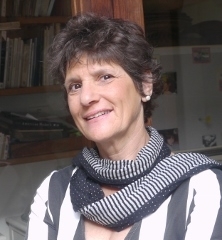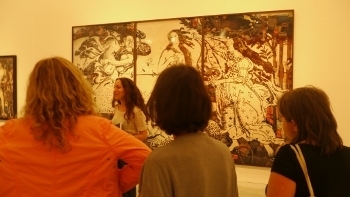Garage: Art and Emotions Side by Side
I met Dalit Sharon, artist and teacher, in Ahad Haam Street, from where we walked the short distance to her house in Neve Tzedek. Seated in a charming enclosed patio, with a kettle put on to boil, we talked.
Why have you called your new venture The Garage?
We decided on that name because we didn't want to sound elitist and patronizing. We want people to feel that everyone is welcome. The Garage is a place that helps people with emotional problems using music, art and design. After a year they should be able to study in a regular art academy, and then work, using their own talents and skills in a regular workplace with other artists, designers and musicians. We looked for a name that wouldn't promise them a rose garden, but would be a place where they could work.
When did you first think of this?
I worked previously as part of the group called Wings (Knafayim). I fell in love with working with these people with special needs and with other artists. We helped the students to be part of the regular art world, bringing a great deal of happiness into their lives. I want to give them tools to live a normal life. Many of them, because of their problems, experience poverty and lose their social capacity. We – I'll be working with others – want to bring them into mainstream living.
Everyone is willing to help, but often the students are not open to the idea of studying. Students first have an interview and then they are set a task. I always pray to G-d that I will not hurt them if they are not accepted for the course. I try my best not to hurt them, but it is important to be very honest with them. It's a big challenge.
What age students are you dealing with?
The main project, the art school, which is pre-academic, will have students between the ages of 20 and 40.
Where?
The Alfred Institute, between Neve Tzedek and Jaffa. A group of young artists called The Alfreds is already established there. It is very important that our students, from the first step, will be mingling with the art world. With me will be 30 to 40 people, mainly artists, and we will build this project together. Some of them also have emotional problems or crises or other issues. Some are not artists, and help us to be more accurate and precise.
What are the hours?
We hope to have 35 students five days a week from 10am to 3.30pm. It is very intensive study, because the concept is to give them depth in the skills of art, general knowledge in the art field, social affairs and the relationship between the languages of art and social issues. As well, we have to give them the skills to be able to study; to study in a regular school; to be able to accept critique; to give critique; to talk the language; to go through the process of developing an ideal to be able to touch the depth that is sometimes painful and, instead of just sinking there, to create a path and to express it in an artistic way and not in an emotional or therapeutic way.
In other words, you're teaching them the discipline of art?
Right, so that when they go to study they already have the basics of a good foundation. I call it a foundation year. In England, the first year of art school is always a foundation. They study a lot of skills before they choose one specific skill. As a result they have general knowledge and they touch every skill. This is what we want to do.
It's an opportunity to create my fantasy, actually.
Let's talk about you…
I was born in a kibbutz in the Negev, moved to a number of places, and was a tour guide in the Sinai during my army service. I studied at Bezalel in Jerusalem, and at last settled in Tel Aviv.
Last year, we gave a course, in collaboration with the Tel Aviv Museum, with people who had already graduated from art school. We met once a week at the museum. The second meeting dealt with music, design and all sorts of things. The third meeting in a coffee shop was with an artist. Because we live in the center of Tel Aviv, we only have to walk in the streets in order to meet an artist and ask him or her to come along for coffee.
Now that I'm over 50, I can give time to others. I knew that I first had to help my own. My three sons are grown up, and the whole family is involved in one way or another in what I do. I share a studio with my oldest son who does film editing. He'll be helping me with the video section of the exhibition I'll be having at the Helena Rubinstein wing of the Tel Aviv Museum, probably in May. The other two sons are very open to what I'm doing, and if there's any need of help they're always willing.
I also lecture at the Technion on architecture, and at Bezalel.
And you enjoy helping people expand their horizons?
Yes, but also at The Garage we'll deal with the concept of borders. In Israel, people say you have to limit your children, set borders, be more precise.
I believe that, working with special people, you must give them boundaries, but they're not necessarily everybody's boundaries. We are trying to create a 'tailor-made suit' for each student. If someone comes to study with us and he's very skilled at one thing, and doesn't have any skill in another, we create some frame that will suit him. We use flexible borders that fit different people.
Dalit showed me, on her laptop, a number of examples of her own art – strikingly beautiful juxtapositions of colors and strong use of line. Many of the pictures are large. I could see how imposing they must be.
Opening day for The Garage was November 30, 2014. Courses follow two tracks: Art & Design and Music, merging and nurturing artistic with personal, social and communication skills. Students will learn to prepare a portfolio, and handle interviews and examinations. The school will continue to support its students, even after their admission to art academies. The school itself is supported and funded by the National Insurance, the Ministry of Health, the Ministry of Welfare, and its operations are based on volunteers and association members.
For more information, phone Dalit Sharon at 052 834 8839, or Ilana Bar at 052 894 7485, or email This email address is being protected from spambots. You need JavaScript enabled to view it.. The Garage's website is: hagarage.wordpress.com and you can also find them on Facebook.










Comments